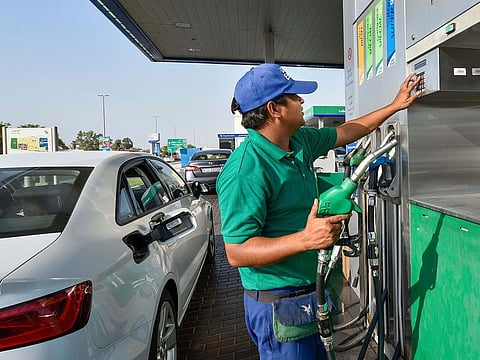UAE residents make lifestyle changes amid changing fuel prices
Many are taking to carpooling, use of public transport, bicycles and e-scooters

Dubai: UAE motorists are resorting to practical and resourceful ways to save on fuel costs. Carpooling and use of public transport, bicycles and e-scooters are some of the readily available alternatives which they have begun embracing. Some say they will still use their cars but will now get more easy on the throttle for fuel economy. A few are preferring to work from home.
Petrol prices in the UAE have dipped in September and the UAE fuel price committee announced on August 31 petrol and diesel prices for the month of September as follows: Super 98 petrol will cost Dh3.41 a litre, compared to Dh4.03 a litre in August, while Special 95 will cost Dh3.30 a litre, compared to Dh3.92 a litre the previous month. E-Plus category petrol will be available for Dh3.22 a litre, compared to Dh3.84 a litre in August, while diesel will now cost Dh3.87 a litre, compared to Dh4.14 a litre the previous month.
‘Play smart’
UAE residents like Nitin Gandhi said one has “to play smart” to achieve fuel economy. He said he will be ditching his SUV on short trips and use public transport instead. “I’ll take public transport during peak hours, especially when traffic is congested. I’ll also try to walk if it’s really just a brief distance,” he added.

Carpooling now
Abu Dhabi resident Hafeed OP, 32, who works as a sales manager, said carpooling is the immediate solution that he and his three friends will do now.
“We all live in Abu Dhabi city and work in Musaffah industrial area. So, instead of us using our individual cars, we will now go in one vehicle to work. Three cars will be left at home at any given and that’s actually good not just to save on fuel but also to reduce traffic and lessen pollution in the environment,” he explained.

Hafeed, who drives a sedan, added: “We will just take turns in using our vehicles.”
Cycle to work
Indian expat and Dubai resident, Nidhin Nandanan, 26, who works at an events and media company, said he and his colleagues are also thinking of carpooling. But he is also planning to buy a bicycle or e-scooter so that he can use it go to office from his home in Karama.

More public transport
Nita Cyril, resident of Skycourts Towers in Dubai, meanwhile, is hoping that there will a new bus route from her residence in Dubailand to Oud Metha, where she works.
“Currently the only bus from here goes to Dubai Mall, and from there we can take the Metro to Karama."

Work from home
Egyptian Reham Eldidi, who works as head of corporate communications at a company, said: “Definitely with the fuel price hike over past few months, I am looking for ways to minimise my commute and decrease my fuel consumption.

Easy on the throttle
Filipino expat Romeo Duque Jr, who works as chief structural engineer, said he will still not give up his crossover vehicle but instead will get lighter on the gas pedal.
His rationale for using his car is convenience and the time he saves.

He explained: “I spend around Dh20 daily on fuel. Apparently, if I take the Metro from my residence in Discovery Gardens to Business Bay, I would spend around Dh15 on Dubai Metro. That’s a savings of Dh5 daily, Dh25 weekly or Dh100 monthly. But I woud have to spend an additional one to one-and-a- half hours on commute. So I will just go easy on the throttle and save some fuel.”
Expert advice
Sri Lankan expat and motoring expert Mitch Perera earlier told Gulf News that motorists can ease the impact of rising global oil prices – and make it easy on the pocket – by improving their driving habits.

“Checking your car constantly and doing regular maintenance is the key. Do a full car inspection on wheels, tyres, engine, oil, filters and other parts – and the car will not only be in good condition but will also have solid fuel economy,” he added.
Perera continued: “On highways, maintain a constant speed between 80km and 100km. Anything lower or higher leads to high fuel consumption. The rule of thumb is – the harder the car engine works, the more petrol it’s going to take. High-speed and rapid acceleration make the engine work harder. So, ease up on the gas pedal and be gentle on the brake pad.”
Other experts have constantly advised motorists to always plan their journey. They should anticipate traffic conditions and avoid rush hour traffic whenever possible. Between highways and routes with frequent traffic lights and turns, drivers should choose the highway if the distance is comparable. And whenever possible, especially on the highway, engage cruise control to save petrol.



